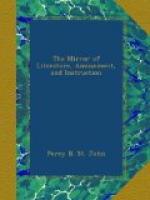LORD BYRON’S PARSIMONY.
It is, indeed, certain, that he had at this time (1819) taken up the whim (for it hardly deserves a more serious name) of minute and constant watchfulness over his expenditure; and, as most usually happens, it was with the increase of his means that this increased sense of the value of money came. The first symptom I saw of this new fancy of his was the exceeding joy which he manifested on my presenting to him a rouleau of twenty Napoleons, which Lord K——d, to whom he had, on some occasion, lent that sum, had entrusted me with, at Milan, to deliver into his hands. With the most joyous and diverting eagerness, he tore open the paper, and, in counting over the sum, stopped frequently to congratulate himself on the recovery of it.
Of his household frugalities I speak but on the authority of others; but it is not difficult to conceive that, with a restless spirit like his, which delighted always in having something to contend with, and which, but a short time before, “for want,” as he said, “of something craggy to break upon,” had tortured itself with the study of the Armenian language, he should, in default of all better excitement, find a sort of stir and amusement in the task of contesting, inch by inch, every encroachment of expense, and endeavouring to suppress what he himself calls
“That
climax of all earthly ills,
The inflammation of our weekly bills.”
In truth, his constant recurrence to the praise of avarice in Don Juan, and the humorous zest with which he delights to dwell on it, shows how new-fangled, as well as far from serious, was his adoption of this “good old-gentlemanly vice.” In the same spirit he had, a short time before my arrival at Venice, established a hoarding-box, with a slit in the lid, into which he occasionally put sequins, and, at stated periods, opened it to contemplate his treasures. His own ascetic style of living enabled him, as far as himself was concerned, to gratify this taste for enonomy in no ordinary degree,—his daily bill of fare, when the Margarita was his companion, consisting, I have been assured, of but four beccafichi of which the Fornarina eat three leaving even him hungry.




